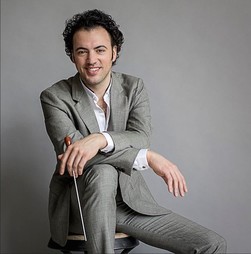 Eric Jacobsen conducts the Knights, sometimes.
Eric Jacobsen conducts the Knights, sometimes. The Knights grew out of score-reading marathons in the Long Island home of Eric and Colin Jacobsen, in the late 1990s.
Indeed, the Knights are part of a “movement” in America towards chamber orchestras built around artistic and personal affinities. For the Knights, what started out as music-making among friends soon led to greater things. In 2004, the orchestra played on New York’s Bargemusic series, and three years later they made their Carnegie Hall debut. Since then they’ve recorded three CDs, and toured in Europe and the USA.
Wednesday’s concert at Koerner Hall demonstrated that the Knights have expanded (to three dozen players) and professionalized without losing their just-out-of-music-school charm. There is a brashness to their style – bold, energetic and bursting with talent. While it’s true that their playing tended to be emphatic – sometimes lacking the subtlety or refinement of a more mature orchestra – their total engagement with whatever was up on their music stands successfully carried the day (or, rather, the evening).
The concert opened with Les Caractères de la Danse, by Jean-Féry Rebel. Written in 1715, this dance-suite gave the Knights a chance to show off their baroque chops. They are no “period ensemble,” and their sound was unapologetically modern in its robust brightness. Bravely playing without a conductor (the whole program was a mix of conducted and non-conducted works) the Knights negotiated quick changes in tempo while holding tightly together.
Shaham stepped out for Prokofiev’s Violin Concerto No. 2, along with Eric Jacobson, who conducted from the podium. I can’t say that I’m especially fond of this concerto – but I can say that Shaham gave a rich, detailed and masterful performance, his brilliant, slightly edgy, tone projecting clearly over the orchestra. And the encore was a sweet treat: Shaham and concertmaster Colin Jacobsen played Sarasate’s Navarra for two violins and orchestra in blended balance.
Playing Wagner’s Siegfried Idyll without a conductor was a risky enterprise, with results that could have been better. To manage without a maestro, the Knights relied on relatively steady, forward-moving tempi to hold the piece together. This approach “worked,” in that nothing went wrong – but a price was paid in a loss of fluidity.
The Knights’ eclectic tastes were further underscored with Sufjan Stevens’ Suite from Run Rabbit Run. Stevens is a Brooklyn-based alt/indie singer-songwriter whose music has been used by the New York City Ballet. Run Rabbit Run, imaginatively arranged for strings by Knights member Michael P. Atkinson, ran the gamut from wild bursts of energy to Barber-Adagio-like repose.
For Dvořák’s Czech Suite in D Major, Eric Jacobsen again stepped up on the podium. He made a wise decision: in his hands, the Knights gave a sculpted and nuanced performance. Foregrounds and backgrounds were clearly delineated, and phrases were nicely contoured. This was elegant and stylish playing.
© Colin Eatock 2016
 RSS Feed
RSS Feed

